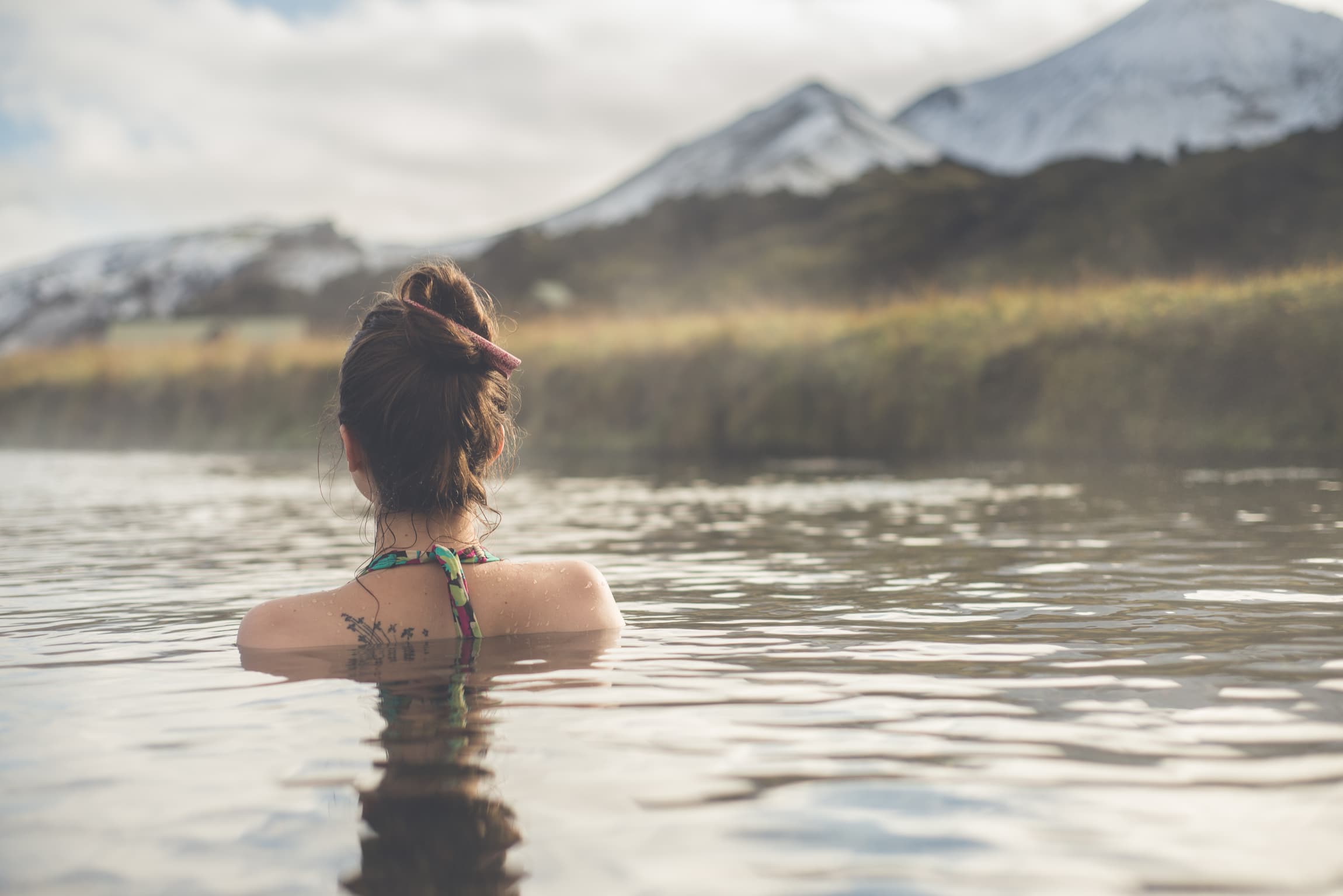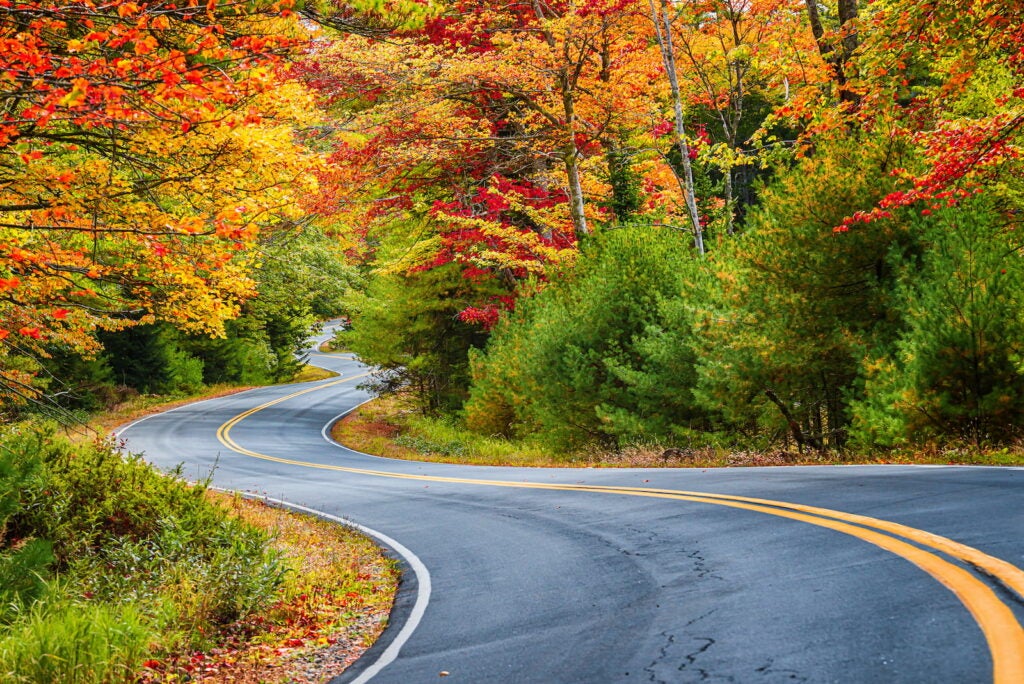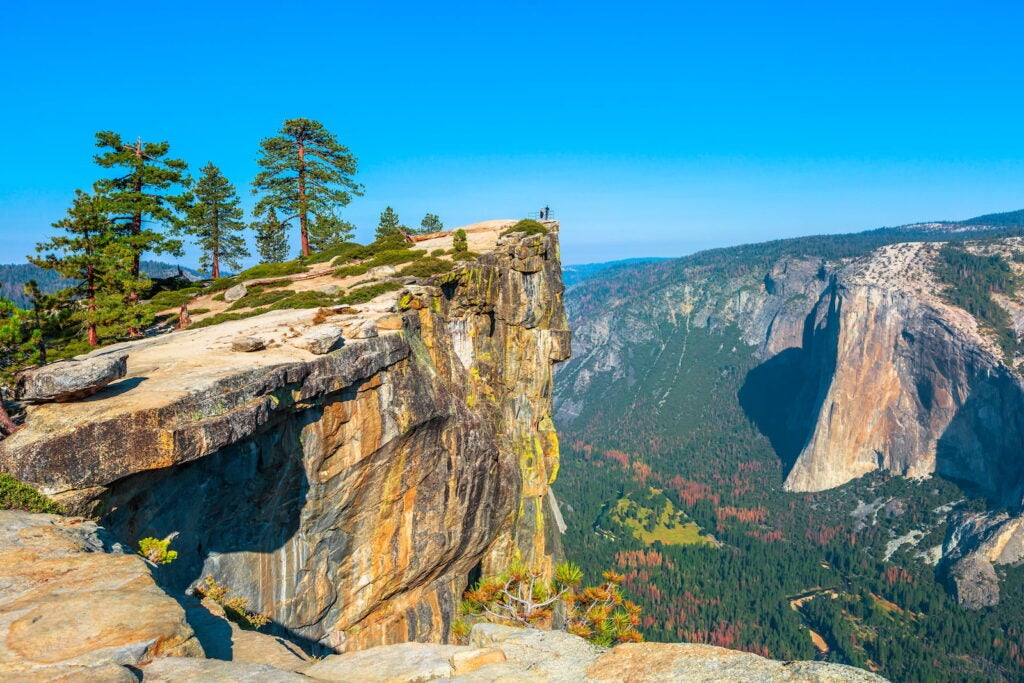As with all exciting things, the first time I learned about Diamond Fork Hot Springs, near Salt Lake City, was through an idyllic-looking Instagram post from a friend who probably gets outside more than I do. In the photo, 20-30 people sat in deep and shallow pools beneath a small waterfall as steam rose above them and some, riskier folks, raised beer cans to their lips. They looked so happy.
What struck me more than the steam or the beer or the fact that these people were in their bathing suits while snow covered the ground around them—was the aquamarine color of the warm wading pools. Vibrant blue water In Utah? In the middle-of-nowhere Utah?
Upon some research, I found that Utah’s history with water features runs deep. Utah is home to at least 12 hot springs and hosts the only warm scuba diving destination in the continental U.S.–a toasty 96-degrees. Near the western border of the state, about two and a half hours from Salt Lake City, divers can also practice at the Blue Lake Wildlife Management Area where 70-degree pools host a 12-foot metal hammerhead shark, placed specifically for practicing divers to find, among other objects.
The 6 Best Hot Springs Near Salt Lake City
For those visiting the Salt Lake City area to hone their powder turns at one of the eight local ski resorts, or to hike one of the hundreds of trails in the Wasatch and nearby Oquirrhs, there are six hot springs less than a three hour drive to soak away sore muscles and be ready for another day in the mountains.
1. Homestead Crater
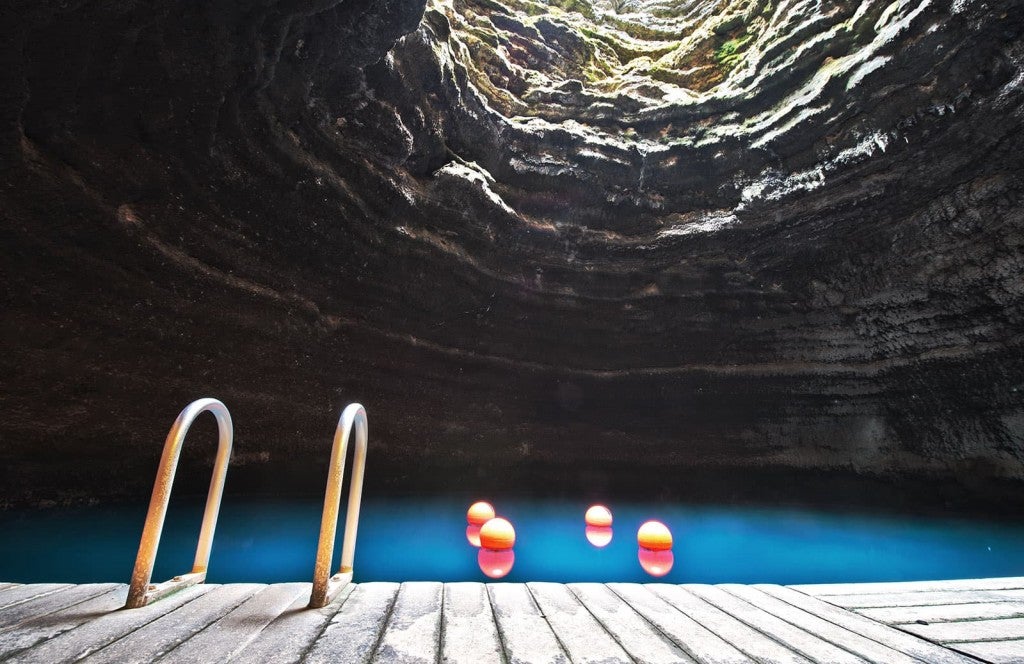
Image from Homestead Crater
Only 52 minutes from Salt Lake City and 35 minutes from Park City, the Homestead Crater makes a perfect rest day option for anyone visiting Park City Mountain Resort, or any of the Wasatch front ski hills. You can scuba dive, snorkel, or simply soak in the 65-foot deep waters, and enjoy the only geothermal hot spring in Utah. The views from within the crater might be most notable, though—you’ll soak beneath a limestone beehive that reaches 55-feet high.
You’ll pay the most to visit this hot spring for the novelty of the geothermal crater: $13 to swim or soak for 40 minutes during the week, and $16 on the weekend. For divers and snorkelers, you’ll pay between $18 and $27 depending on when you go. This is one of the busier hot springs near Salt Lake City — reserve ahead of time!
The Easy Way to Find Last-Minute Campsites
Did you know some campers have:
- Pre-saved lists of hand-picked free camping across the US
- Text messages for last-minute openings
- Scans set up for National Park site openings
This is the easiest, most surefire way to find last-minute campsites every time, and it’s all included in the #1 camping membership called The Dyrt PRO. It costs just $35.99 per year and is an easy way to make sure you have better camping trips every time — and that you can actually find a spot last minute.
You can check it out for free today, you can even use it for free for 7 days to make sure you like it. After the trial it is $35.99 for a full year — most campers find it pays for itself after a night or two. If you camp more than 2 times per year, it may be perfect for you.
2. Saratoga Hot Springs
Those looking for a (hopefully) less crowded hot springs near Salt Lake City, look no further than this naturally occurring, muddy pool just 40 minutes outside Salt Lake City. The area doesn’t offer amenities other than bathrooms at the trailhead, so bring a tarp to lay out your belongings and changing as the ground around the pool becomes muddy after a rain or snow storm.
The waters here are clear and the views are stellar. During winter, the snow-capped Wasatch mountains are visible to the east, and the Oquirrhs to the west.
3. Crystal Hot Springs
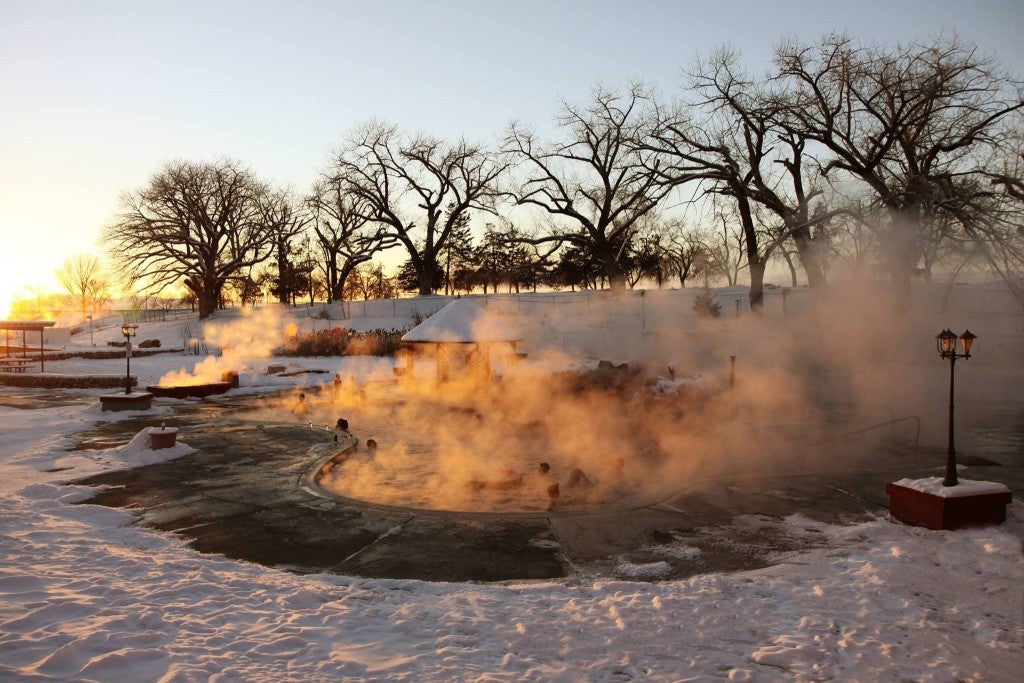
Image from Crystal Hot Springs
A one of the more developed hot springs near Salt Lake City, soaking at Crystal is as close to a spa experience as you’ll find, with multiple swimming pools, a lodge, and over 100 campsites. Admission prices are regularly $9 for adults and $7 for children, but on Wednesday nights families of six can swim for $20 total.
If crowds aren’t your thing, come early in the morning on a weekday. Otherwise, the pools fill up with soakers and swimmers of all ages.
4. Meadow Hot Springs
Located on private property, Meadow Hot Springs are deep enough to scuba dive, and warm enough to visit in the dead of winter. The property owner is generous enough to allow visitors to not only visit the pools, but to also camp on the property and enjoy a campfire nearby.
Be sure to follow all posted signs and rules to maintain access to the hot springs. There’s also a donation box for visitors to contribute to the upkeep of the springs and surrounding land.
5. Fifth Water Hot Springs
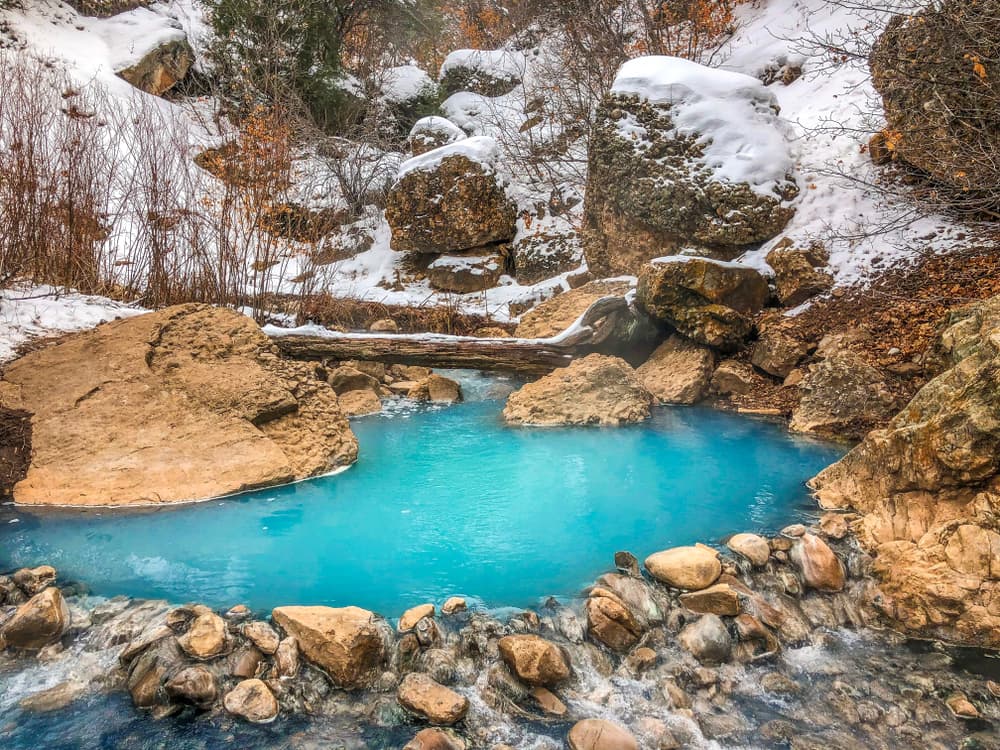
One of Utah’s most popular naturally-occurring hot springs, Fifth Water (a.k.a. Diamond Fork) sits 2.5 miles down a trafficked trail with only 700 feet of elevation gain. The hike itself is worth the one-hour drive as it weaves through a red rock canyon and alongside a slow stream.
During the winter, it’s possible for the road to the trailhead to close, adding six miles to the trek. But, with a fatbike or cross-country skis, the additional miles are easier, and more fun to cover. Call the Diamond Fork Guide Station (Forest Service office) ahead of time to check road conditions and closures: (801) 798-3571.
6. Baker (Abraham) Hot Springs
Traveling through Utah’s west desert requires more planning than traveling, to be sure. But once you take a right on any exit on southbound I-15, there are plenty of treasures to enjoy like the temperature controlled Baker Hot Springs, near Salt Lake City located just outside of Delta.
The water in each pool is naturally too hot to soak, so a PVC pipe with cool water enters the pool for the desired temperature. You won’t be able to fit many adults in each of these pools, maybe three per tub, making it perfect for winter dates or reflection and solitude.
Preparing for Your Tranquil Visit Salt Lake’s Hot Springs
Turns out spending time submerged in a pool of hot water has a whole host of benefits like stress reduction and increased blood flow. The Japanese have known this for a long time, having used natural hot springs as an integral part of their culture and relaxation routine for centuries.
Health Benefits of Bathing in Hot Springs
It makes sense that being surrounded by warm, toasty water helps you feel less stressed. This becomes obvious each time you light a few dozen candles, turn on some Enya, and pour a bag of bath salts in the tub. But natural hot springs have an added benefit—mineral absorption. Each time you soak in a mineral hot spring, your body absorbs a cocktail of minerals that help to boost your vitality. Many also claim that hot springs can help reduce the effects of chronic illness, skin conditions, and high blood pressure.
Even if there are some benefits that are bunk, it’s well worth the possibility of experiencing health benefits alongside the powerful mental benefits of relaxing in a pool of natural, warm water.
What To Bring And What Not to Leave Behind
When I visited Utah’s Saratoga Hot Springs, I was woefully underprepared. For starters, it was the middle of winter, which required extra layers, thick socks, and closed-toe shoes. There are no changing rooms at natural hot springs, so bringing a pair of hiking sandals, like Chacos or Tevas can help when changing and walking to/from the hot springs.
Don’t forget a towel, an extra pair of socks, and snacks as well. We were surrounded by veteran hot spring attendees who had brought lunch, beverages, snacks, and plenty of water. We ended up cutting our experience short because we were both starving.
As always, practice the principles of Leave No Trace. In these fragile hot springs environments, which are experiencing increased traffic as they grow in popularity, it’s important to take care of the trails and surrounding areas so we can all enjoy the hot springs for years to come.
This article is brought to you by Banner & Oak
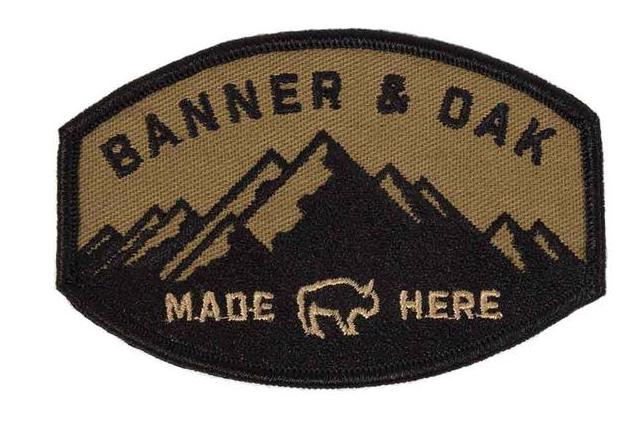
Their snapback trucker hats is the perfect addition to your next adventure to a hot spring.
Related Campgrounds:
- Cowboy Camp, UT
- Goblin Valley Camping, UT
Popular Articles:
Articles on The Dyrt Magazine may contain links to affiliate websites. The Dyrt receives an affiliate commission for any purchases made by using such links at no additional cost to you the consumer.

